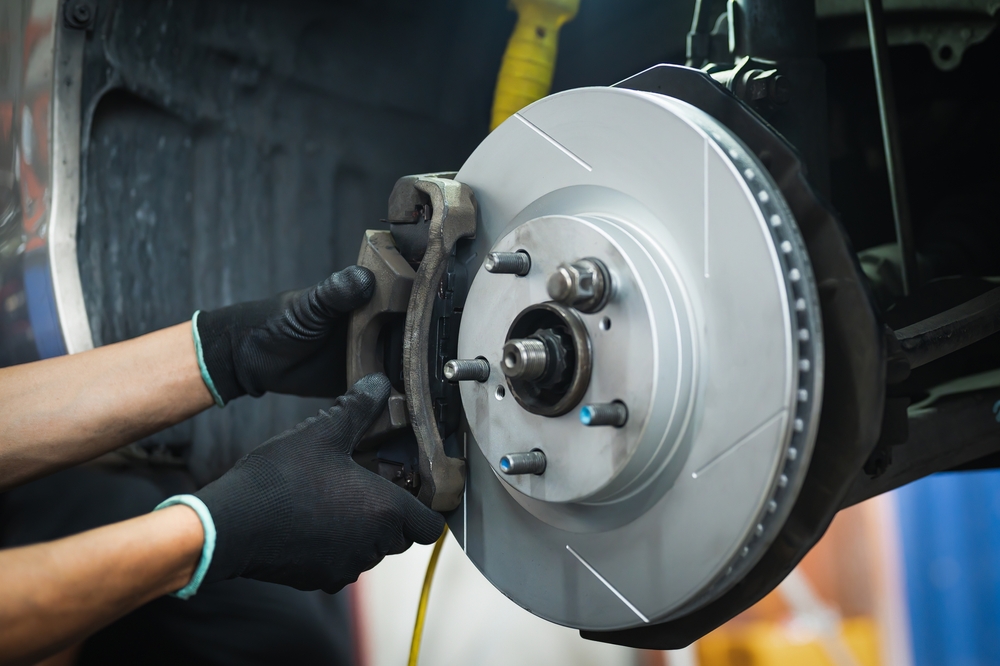When to Replace Your Brake Pads? Signs You Shouldn’t Ignore

Your brakes are the only thing standing between you and a potential accident. But when was the last time you checked them?
Like all other vehicle components, Brake pads also wear out with time. If you continue driving with worn-out brake pads. Your vehicle’s stopping power can be compromised, putting you and others at risk.
On the other hand, if you identify the signs to replace your brake pads. You can take timely action & prevent costly repairs and dangerous situations.
Don’t know which signs to look for? We will guide you with that.
At Schon Automotive, we keep your car running safely and smoothly. Our team of auto experts helps Perth drivers stay safe with routine brake repair and maintenance. So, your brakes don’t let you down when you need them most.
Read on to spot the warning signs before they become a safety hazard.
7 Signs That You Need to Change Your Brake Pads
Brake pads are a necessary component of your vehicle, providing the friction to slow or stop. They transmit the pressure and friction applied to the brake rotor to the wheel. If they are damaged, you will not be able to stop your vehicle on road.
But that doesn’t happen overnight. Here are some signs your brake pads will show before deciding to call it quit.
1. Dashboard Brake Warning Light
Modern vehicles come equipped with brake sensors that alert you when brake pads replacement is due. If you see a brake warning light on your dashboard, it’s time to check your brakes.
However, not all brake warning lights mean the same thing. Your car has two different indicators:
- Brake Pad Wear Sensor Light: This light indicates that your brake pads are wearing thin and need to be replaced soon.
- Brake System Warning Light: If this light comes on, it could indicate a deeper issue, such as low brake fluid, a faulty master cylinder, or worn-out brake components.
Ignoring these warnings can lead to brake failure. So, you should keep an on them & replace your brake pads before the situation worsens.
2. Squealing or Screeching Noises
Ever noticed an annoying high-pitched squeal when you press the brake pedal? This sound is usually your car’s way of telling you that your brake pads are wearing out.
Most brake pads have built-in wear indicators. Tiny metal tabs designed to make noise when the pad gets too thin. This screeching sound is a clear signal that you should change brake pads before they wear down completely.
However, if the noise disappears after a while, don’t forget about it. It means that your brake pads have worn past the indicator. And are now damaging your brake rotors, which is a much bigger (and costlier) problem.
3. Vibrations or Pulsating Brake Pedal
If your brake pedal vibrates or pulsates when you press it. You could be dealing with one of the following issues:
- Warped brake rotors: Excessive heat from braking can cause the rotors to warp, leading to an uneven braking surface.
- Uneven brake pad wear: One side is wearing down faster than the other, causing a rough braking feel.
- Debris or contamination: Dirt, dust, or small stones trapped in the braking system are causing unusual vibrations.
Regardless of the cause. Any brake pedal vibration should be checked by a professional mechanic.
4. Slower Braking Response or Increased Stopping Distance
Have you noticed that your car takes longer to stop than usual? This can be extremely dangerous, especially in emergencies. When brake pads become too thin, they struggle to create enough friction to immediately stop the car.
As a result, your vehicle stops a few meters ahead of the required spot. And these few meters can cost you more than you imagine.
If you feel like you have to press the brake pedal harder than before. Or if there’s a slight delay in response. Your car is clearly trying to say: “change my brake pads.”
5. Car Pulling to One Side When Braking
If your car pulls to the left or right when braking. It means one side of your brake pads is more worn than the other. This uneven wear causes an imbalance, making the car veer in one direction.
However, don’t forget to rule out the other possible causes first, including:
- Stuck brake callipers
- Uneven brake fluid distribution
- Misaligned suspension components
Ignoring this problem can put extra stress on your steering and suspension. So, as soon as you notice it, consider replacing your brake pads.
6. Grinding or Metallic Sounds
If you start hearing a deep grinding noise when you brake. Beware! it shows that things have gone from bad to worse.
It is usually the last sign of brake damage. Meaning that your brake pads are completely worn down now. And the metal components are rubbing against each other.
Not only does this increase stopping distance, but it also damages your rotors. Requiring expensive repairs or replacements. In some cases, the entire braking system need an overhaul.
7. Visibly Worn Brake Pads
Once you have spotted one or more signs listed above. It is time for a visual inspection.
Take a flashlight and carefully see through the holes of your tyres, known as the wheel spokes. Check for the signs of wear & tear. Also, try to measure the thickness of your brake pads.
If the pad material looks thinner than 3mm, it’s time for a brake pads replacement.
If you’re unsure, visit an expert mechanic, like Schon Automotive for a brake inspection. We will check the thickness of your pads and let you know if they need to be replaced.
How Long Do Brake Pads Last?
There’s no universal answer to how long brake pads last. But the average time-span for most brake pads is:
40,000 to 100,000 km
OR
25,000 to 65,000 miles
There are a lot of factors which increase or decrease this period. So, you can maximise the distance between your brake pad replacements by adjusting them.
Factors That Affect Brake Pad Lifespan
Here are some important factors affecting the life span of your brake pads.
Factor | Impact on Brake Pad Lifespan |
Your Driving Habits | Hard braking wears out brake pads faster. |
The Terrain You Drive On | Hilly areas and city driving wear down brake pads quickly. |
The Type of Brake Pads You Use | Ceramic brake pads last longer and are quieter but can be expensive. |
Quality of Brake Pads | The brake pads from a trusted source and quality company last longer. Proper installation is also required for its good health. |
Vehicle Load | Heavier cars and frequent towing put more stress on brakes, wearing them out faster. |
Regular Maintenance | Routine brake inspections keep you aware of its condition Timely brake pads replacement prevents excessive wear. |
Keep these factors in check to enjoy a longer lifetime of your brake pads.
Conclusion
Your brake pads are one of the most important safety components in your car. Ignoring signs of their damage can lead to dangerous driving conditions and expensive repairs. These signs include squealing noises, slow braking, vibrations & dashboard lights.
By keeping an eye (and ear) out for these signs. So, you can replace your brake pads before they fail completely. Arrange regular inspections and timely replacements to avoid costly repairs & accidents.
Wondering When to Replace Brake Pads? & Where to Find Experts for it?
Get Your Brakes Checked at Schon Automotive: Perth’s Trusted Vehicle Specialists
At Schon Automotive, our quality brake repair services keep your car safe on the road. Our skilled mechanics use advanced diagnostics to detect and fix any brake issues. Before they can worsen & become serious problems.
We offer you:
- Transparent Pricing – No hidden surprises, just honest quotes.
- Fast Turnaround – Get back on the road quickly.
- Customer Satisfaction – We stand by our work with confidence.
- Expert Technicians – Skilled professionals with experience in all makes and models.
- Latest Diagnostic Tools – Precision testing for accurate repairs.
Don’t risk driving with worn-out brake pads!
Let’s keep your brakes in top shape! 🚘
